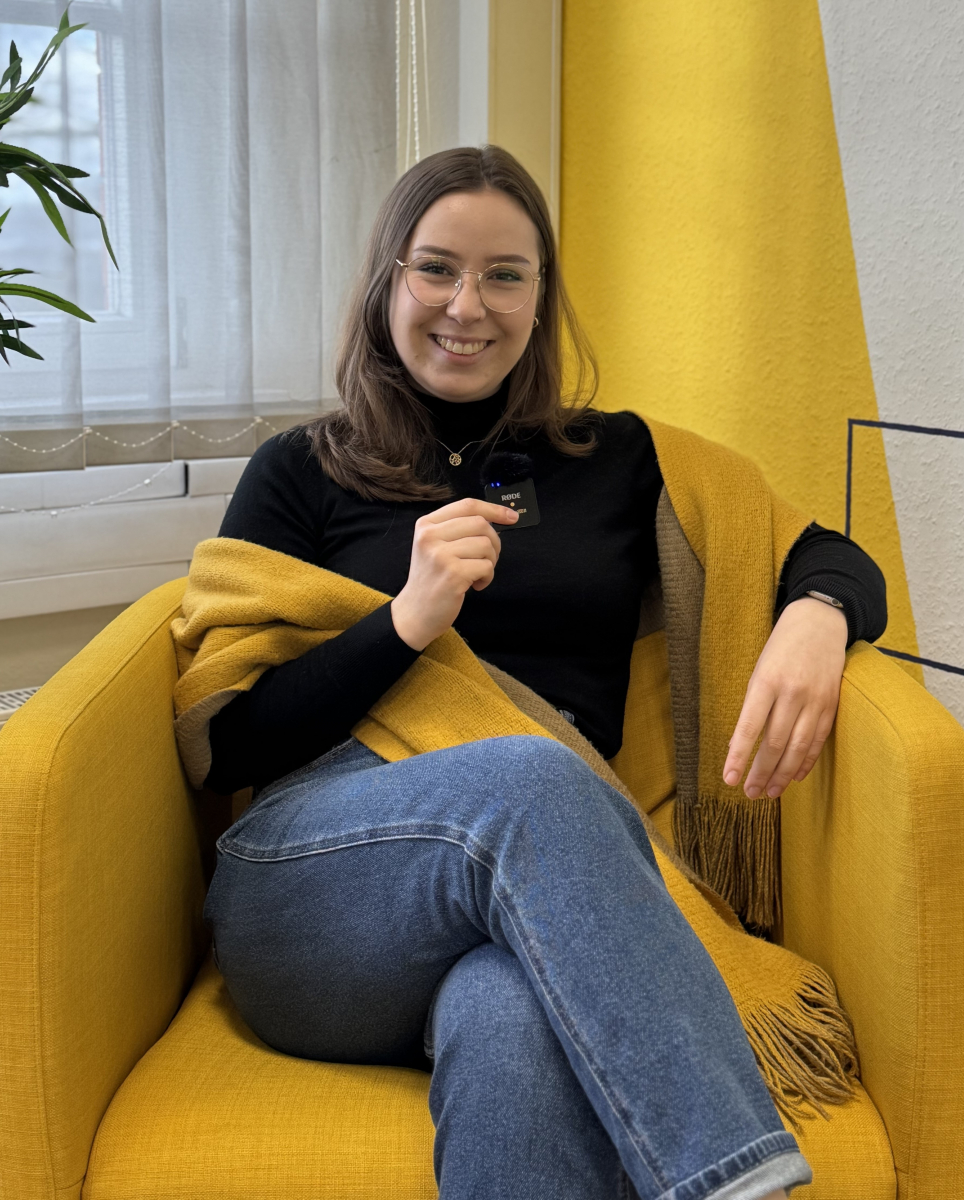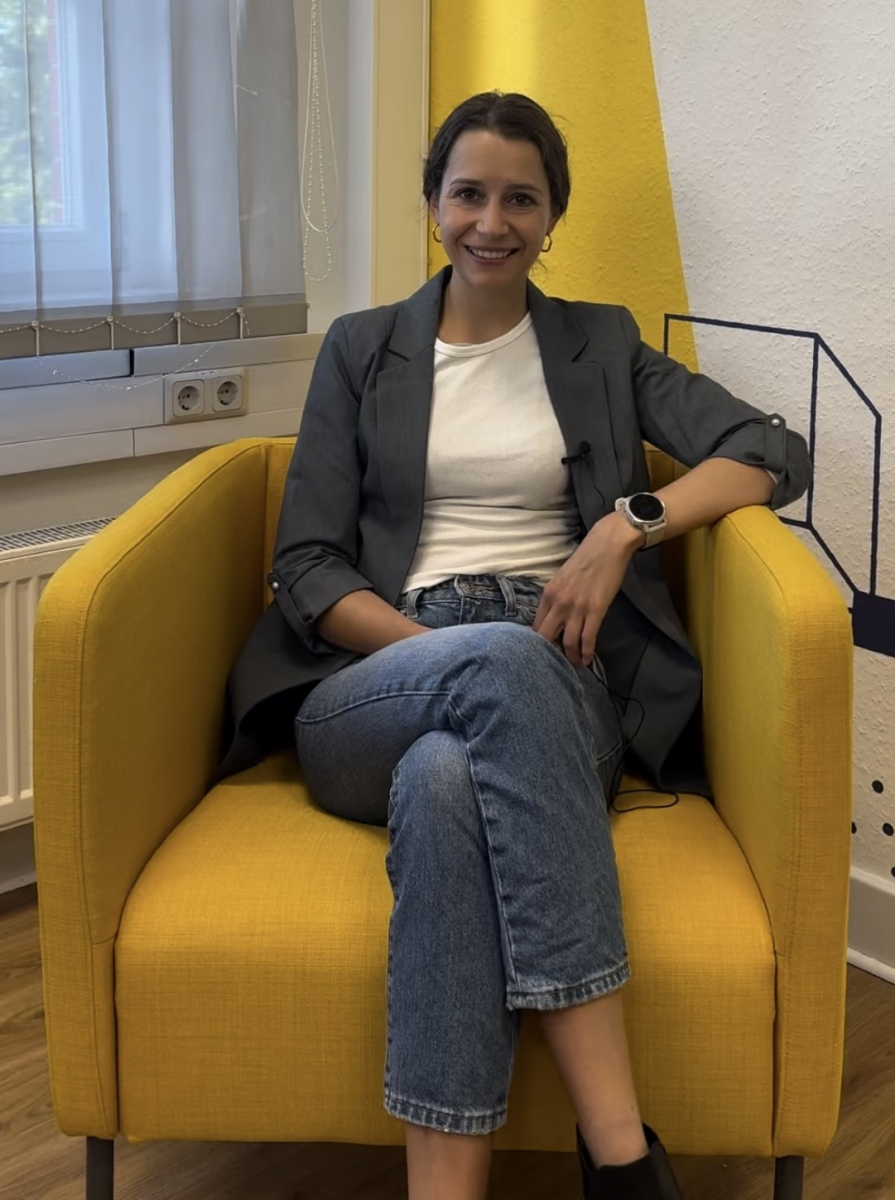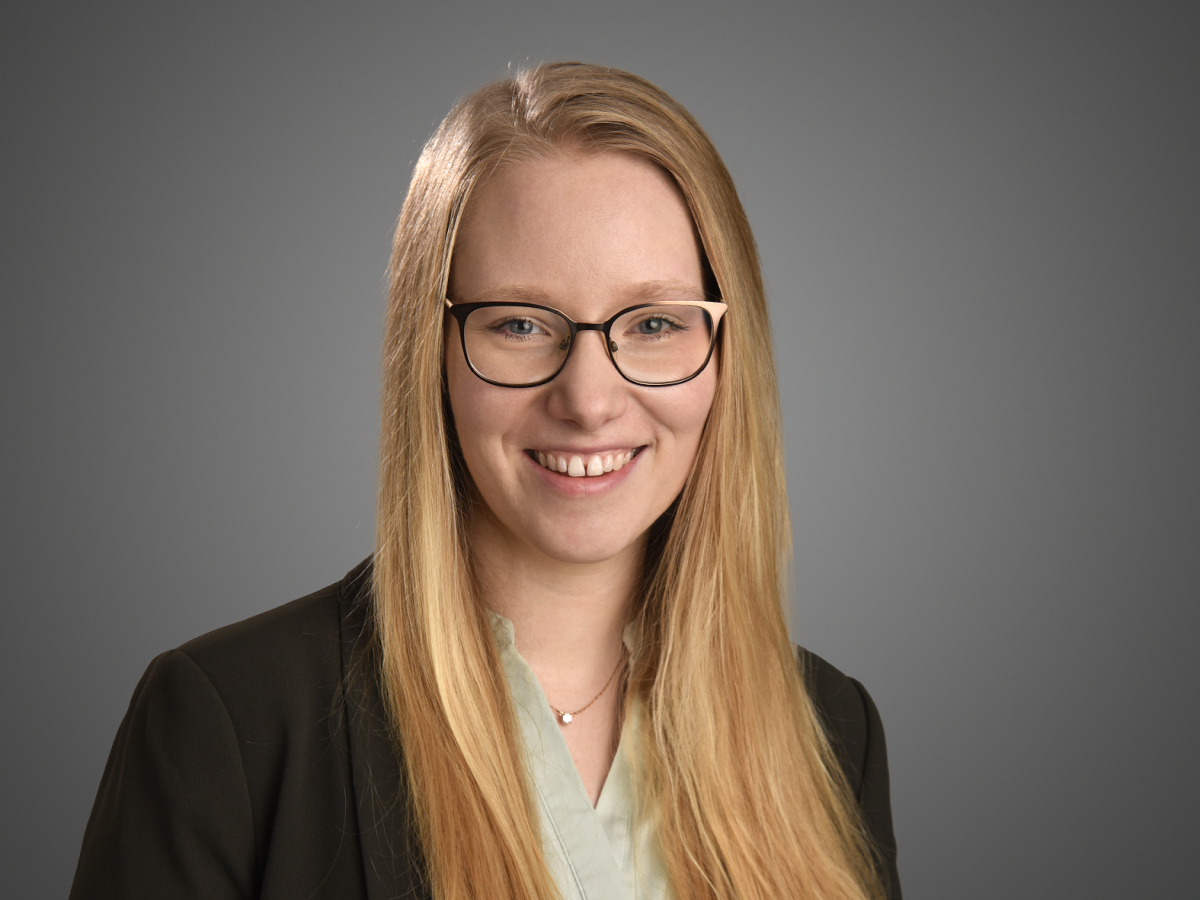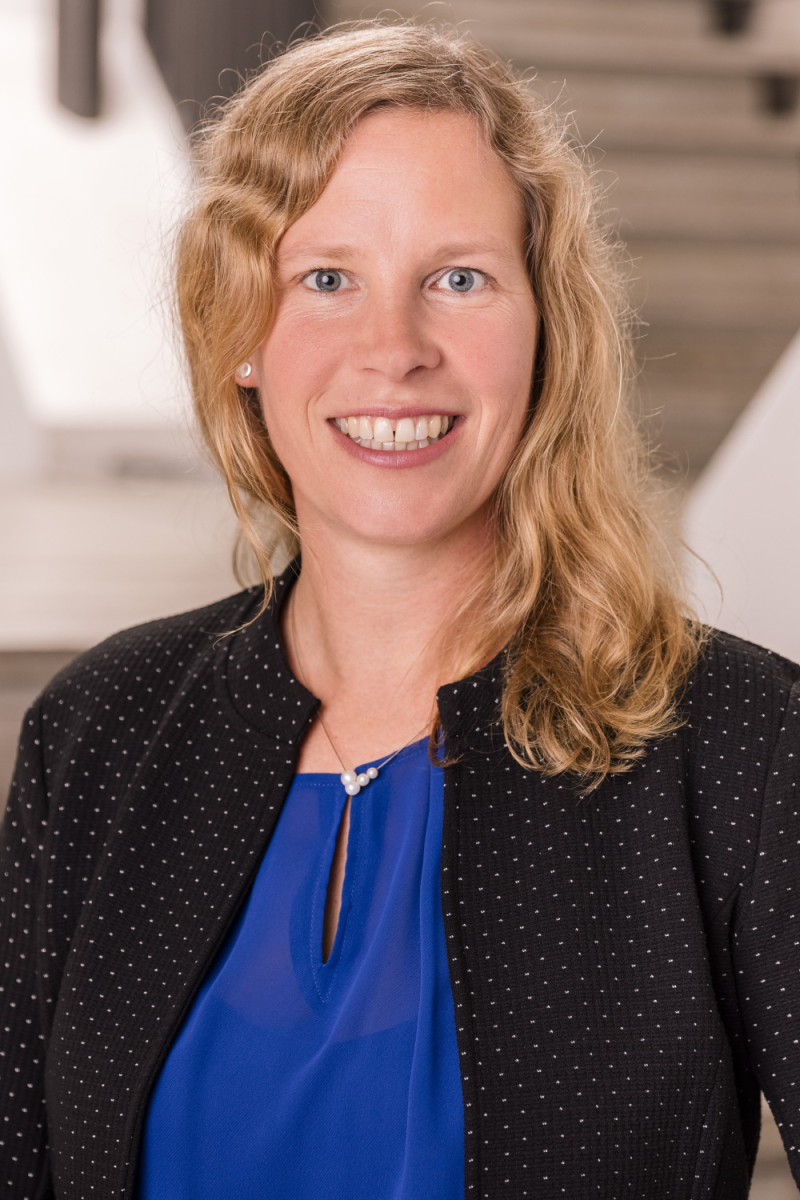Our female researchers
The University of Münster and our Department advocate for gender equality and strive to increase the number and visibility of women in science. The following experience reports by our female researchers provide insight into the academia of the field of Information Systems. Through sharing their journey, we want to encourage more female students to pursue career paths in science.
-
Melanie Schmidt
 When did you realise that you wanted to work in the field of Information Systems?
When did you realise that you wanted to work in the field of Information Systems?
I realised that Information Systems was right for me after I graduated from high school. I enrolled straight into the bachelor's programme and had no idea at that time how deep I would actually delve into it and the more I learned in the bachelor's, master's and even now, the more I realised that it was totally my thing.
Why Information Systems and not pure economics or pure computer science?
At the beginning, I was focused on the computer science part, but then I realised straight away that it is not really an either/or, but that Information Systems is a completely separate, fascinating field and is exactly the field I find exciting.
What has been your greatest success in your academic career?
My biggest success is definitely all the positive feedback from my students. After courses or after final theses, quite a few have taken the time to tell me again that they like my way of doing things or that they have taken something away with them. That simply means an incredible amount to me because it shows me that I can make a small difference for that person.
Would you like to stay at the university after your doctorate?
First of all, I think it is basically super cool that so many doors are open to me: in the direction of practice or science. At the moment, I'm not sure whether I will stay in academia. But I really enjoy being part of the community.
What do you wish you had known about the Department of Information Systems before you came to Münster?
I would have liked to have known earlier how many varied programmes there are at the department. There are so many impressive opportunities to organise your own studies here and if I had known that earlier, I might have come to Münster sooner.
-
Nina Herrmann
 When did you realise that you wanted to work in the field of Information Systems?
When did you realise that you wanted to work in the field of Information Systems?
I realised during my studies for the first time that I really enjoyed it. Before my studies, I was quite good at economics and also really liked computer science. However, during my studies and especially in the phases where you start to apply your knowledge, I realised that I really feel comfortable with what I am doing here.
What do you wish you had known about the Department of Information Systems before you came to Münster?
I also did my bachelor’s degree here in Münster and what I really have liked to have known in the first semester is that there is a very large archive of exams you can use to prepare yourself really well.
What was your greatest success in your academic career?
I handed in my doctoral thesis in June 2024, and it encompasses everything I have been doing for the last four and a half years. Therefore, that is definitely my biggest achievement.
Why do you want to stay at the university?
I have really enjoyed both the research and the teaching and as I have the opportunity to stay here, I wanted to see where my path takes me next.
What advice would you like to give students for their future time at the department?
I would advise you to always look for topics that excite you and that you also see a purpose in, because the easier it is to get involved with them.
-
Miriam Möllers

What is your research area?
Since March 2022 I am a PhD student at the Chair for Digital Transformation and Society under Jun. Prof. Benedikt Berger. In short, I am working on the transformation of work through the use of and interaction with AI-based systems in the work context. Overall, this is a very complex and dynamic field of research that covers a wide range of topics. I am particularly interested in how the use of AI-based systems affects existing tasks and work processes, and how employees react to these changes. One very exciting topic, for example, is professional identity. Another closely related area is human-computer interaction, which looks at how people interact with the output of AI-based systems. As the topic is just starting to gain momentum in the real world, there are still many unanswered questions. However, earlier this year we launched a case study supporting the introduction of machine learning in financial planning.
What is the goal of the research project? What are the expected results?
Unfortunately, research results are not necessarily predictable, especially when human beings play a crucial role. As the case study is qualitative in nature, we may well end up with completely different results than we expected. So not much can be said at this stage. What can be observed at the moment, however, is the following: The current social discourse revolves around the question of what impact AI-based systems will have on work - will people become unemployed in the future, or will they adapt to the changed conditions? Even if we cannot predict future developments, many studies currently show that humans and systems do not necessarily replace each other, but rather complement each other. Both have their own strengths and limitations, which complement each other well. For example, it is likely that the analysis of large amounts of data or time-consuming repetitive tasks will be transferred to systems, while humans will deal with qualitative issues, evaluating the quality of the output in context and deriving meaningful decisions. This is also likely to be the case in financial planning, where data-driven forecasting is critical, but a deep, causal understanding of the business and its impacts is also very important.
What subject did you study and at which university? How did you find out about Information Systems and our department?
I always say that I have taken a journey through economics. I started with a bachelor's degree in Cultural Economics at the University of Duisburg-Essen. This is an interdisciplinary degree in economics and linguistics, in my case English. At first glance, these seem to be two very different subjects, but in Cultural Economics they come together. I had my first contact with Information Systems during my basic studies, but at that time I would never have thought that I would later end up in this field.
As I was particularly interested in macroeconomic and social issues during my bachelor's degree, I decided to do a master’s in economics. In addition to a strong focus on econometric methods, I was particularly interested in topics related to financial market analysis. It was only towards the end of my master's degree that I discovered the field of labour market economics, which was also the subject of my master’s thesis.
As part of my master's thesis, I used a panel data set to examine how participation in continuing education can affect earnings. Digitalization and its impact on labor markets also play an important role in this area of research. After all, the changing demands on labor markets due to digitalization and the use of artificial intelligence are among the main reasons for continuing education. And I found that exciting. When I decided to give the topic of doctoral studies a chance, I looked at various job offers in the field of labor market and education economics. By chance, I saw Benedikt Berger's job ad, and the focus on "digital transformation and society" alone piqued my interest. Information Systems wasn't really on my radar. Apart from working with statistical software like R and STATA, I had little contact with programming. But I thought it could be exciting and easy to apply.
What does a typical day at the office look like for you?
There is always a tension between your own research and your obligations at the chair and in teaching. That's both the exciting and challenging part of working as a research assistant. I had to get used to this in the first semester in particular, especially as many of the processes at our junior professorship were not yet so established and the research field of Information Systems was completely new to me. As we had taken over a course, we spent a lot of time revising the content. On the one hand, this was a good opportunity to familiarize myself more with the IS literature, but on the other hand, there was little time to deal with my own research topic. You're actually in this area of tension the whole time. However, I now know what my specific topics are and can structure my day-to-day work well.
Ideally, my working day looks like this: I always start with my emails in the morning and then try to deal with my own research in the morning. That's the time when I'm most productive and creative and have the opportunity to think a little more deeply. In the afternoons, I tend to devote more time to teaching and meetings with students for their final theses. However, depending on whether the start of the semester is approaching or a deadline is imminent, the day can look completely different.
What do you like most about working at the department?
I like the variety of tasks. On the one hand, I enjoy teaching, discussing seminar topics with the students or designing the exercises. On the other hand, I do research on topics that I am particularly interested in. You also have a lot of freedom. On the one hand, this is great because I can organize my working day as I wish, but on the other hand, it sometimes means that the boundaries between private life and work become somewhat blurred and you have to learn to juggle them. I also like the international environment - as we share the corridor with Prof. Klein's chair, there are often visiting academics who are always willing to listen and share their (often many years of) experience. Overall, the environment is very dynamic and young, which makes working here very relaxed and varied.
Information Systems often seems to be a male-dominated field of work and research. What motivated you, as a woman, to become an academic in Information Systems?
I don't mean to disagree, but at least in my perception, the academic environment is not as male-dominated as you might think from the outside. Of course, there is no gender balance in the student body, but at the same time, as a woman, I don't see myself as a minority among the staff of the institute. In my field of research and work, I don't see it as a male-dominated industry - but it must also be said that in our research area at the chair, we serve the typical interface of Information Systems and are therefore closer to sociological topics than purely technical ones. In the private sector, this can also be different from the university sector.
What are some stereotypes about working in STEM that aren't true?
During my undergraduate studies, I found Information Systems to be a rather dry subject. We had to memorize a lot of definitions and procedures, and we learned SQL code without actually using the system. Of course, my view of Information Systems has changed since then, and I especially appreciate the interdisciplinary nature of the research. I just didn't realize that social issues were an essential part of Information Systems.
Do you have any tips for future female applicants and career starters?
I found both languages and mathematics easy at school, which I tried to take into account when choosing my major. Due to a lack of exposure, I couldn't really imagine studying a technical subject, so I decided to go in the direction of economics and linguistics. It was only during my studies that I realized that programming can be really fun and that technology has so much to offer. So I have some advice for high school graduates: If you have a little interest in technology, in programming, then give it a try! You'll either find that it's exactly what you've always wanted to do, or you'll realize along the way that it's not the right thing for you. Information Systems in particular offers a lot of scope to go in a more technical or economic direction. In my opinion, this is the crucial aspect, that for many women it is not a lack of interest, but a lack of contacts.
-
Dr. Katrin Bergener

How long have you been working at the Department and what are your responsibilities?
I have been working at the Department of Information Systems for a long time. I started here in 2006 and worked as a student assistant for almost a year during my studies. Then I worked as a research assistant for Prof. Becker at the Chair of Information Systems and Information Management and finished my PhD in 2014. Since then, I have taken on a variety of tasks. For example, I have been teaching the "Introduction to Information Systems" course for first-year students together with Armin Stein and Bettina Distel. In addition, I regularly offer advanced modules with colleagues, including international partners such as the University of West Georgia. I supervise bachelor and master theses, run the bachelor preparation course, am responsible for marketing and public relations, and am currently working on an Erasmus+ research project together with Armin Stein and Kilian Müller as well as colleagues from Grenoble and Liechtenstein. I am also the coordinator of the Centre for Europe, a university-wide center that brings together members from all areas of the university working on Europe-related activities. So I never get bored.
What has your academic and professional career been like?
I actually came to the Department of Information Systems as a non-specialists. I studied Linguistics in Münster, Germany, and in Auckland, New Zealand. During my studies I happened to see a job advertisement at the Institute for Information Systems for student assistants in the area of public relations and translation work. As a student in a completely different program, I got to know the institute and the variety of topics that are researched and taught. That sparked my interest. After my studies, I had the opportunity to work as a research assistant in the ManKIP research project - Management of Creativity Intensive Processes. I got to know the research work better and better and the idea of writing my PhD thesis in this context matured over the months. However, I had to catch up on a number of Information Systems courses over a period of two years in order to be admitted to the doctoral program as a non-specialist in business informatics. It was a challenge and it wasn't always easy. But I enjoyed it, it worked well, and looking back I can definitely say that it was worth it. It opened up a whole new field for me and, as you can see, I have remained loyal to the Information Systems.
Information Systems often seems to be a male-dominated field of work and research. What motivated you, as a woman, to become an academic in Information Systems?
Through my work on the first ManKIP research project, I have already realized how diverse the subject of Information Systems actually is. Information Systems is fundamentally concerned with digitalization in business, administration and society as well as the development and application of information and communication systems in these areas. The advancing digitalization that we have seen in recent decades naturally has an impact on all areas of life and all people, regardless of their gender, educational background, current stage of life, etc. And that's why I think that the subject of Information Systems is an important one. And that's why I think it should be inherently equally interesting for everyone.
As part of my doctoral research, I focused a lot on (virtual) creative teams and how they can work together, so I did a lot of research on team composition. The research shows that diverse teams (diverse not only in terms of gender, but also in terms of age, language and cultural background) often face challenges, but that these different backgrounds also bring a lot of different knowledge to the table. Diverse teams are often more innovative and generally more successful. That's why I think it would be incredibly important and great if we were as diverse as possible in Information Systems. Personally, I always find it exciting to work with people from different backgrounds and perspectives. I am convinced that this can only be beneficial for both teaching and research at our institute.
Since I've been working at the Department, I've never felt that I wasn't included or accepted. There have always been more men than women at the department, but that has never been a problem, so I can really only speak up for my male colleagues. Still, I think it would be nice if we could become more diverse at the Department of Information Systems in general.
What are some stereotypes about working in STEM that aren't true?
Children have often already internalized cultural biases, such as that girls are less interested in computer science and science than boys. And if certain activities and school subjects are so prejudiced from an early age, it naturally influences their general interest in them. If I'm exposed to that as a child, I might not even think about studying math or computer science later on.
That's why I think it would be great if we could show boys and girls without prejudice what opportunities are available to them in STEM. Ideally, this should be done in a playful way in kindergarten and primary school, by trying out and experiencing lots of things in a completely non-judgmental way.
That's what we thought a few years ago when we launched our Digital Me project, and that's exactly what we've done: Make IT careers tangible. To do this, we developed the IT for Girls website, where girls and young women can learn about IT careers in a fun way. There is an avatar, Anna, who guides you through a city with different buildings where you can get to know different IT professions. And for each profession there is a game where you can test your skills for that profession, there are videos and interviews with women who work in those professions and tell how their day is actually structured. In this way, we want to show the diversity of career opportunities and also that IT jobs can be creative and often involve working in a team. The goal was to give the girls the opportunity to explore and experience for themselves what it is like to work in these professions and possibly break down existing prejudices.
What do you like most about working in an academic institution?
First and foremost, I like the freedom I have in my job: The breadth of my current responsibilities allows me to apply for and conduct interest-driven research projects. I can offer courses on topics I enjoy and supervise theses that interest me. I also really enjoy working with international teams in research and teaching, with colleagues from all over the world. ERCIS has really become a family to me over the years and it's always a pleasure to meet colleagues at conferences or events. I find this close connection and exchange with international colleagues incredibly valuable.
On a personal note, my job at the university gives me a lot of time flexibility, and as a mother of two school-age children, that's very valuable. Even before the coronavirus, I had a lot of flexibility in my work, but the pandemic has shown us all once again that many of our activities can work well from home - this flexibility in time and space is incredibly helpful for a relaxed everyday family life.
What does a typical day at the office look like for you?
I don't really have a typical workday, and because of Corona, my workdays have changed a lot over the last two years. But basically: I always start with a coffee and check my emails. Then I check what's on the agenda for the day, often together with Armin Stein, because we do a lot of teaching and ERCIS together. Then I have meetings with internal and external colleagues to discuss research projects, to coordinate in ERCIS, to prepare teaching, etc., publications have to be read or worked on. Since 2016 I'm also the coordinator of the Centre for Europe and in this role, I regularly attend meetings, answer researchers' questions about EU funding, give feedback on applications or put them in touch with contacts in Brussels. Of course, I also have teaching duties during the semester. When I supervise dissertations, I also have regular meetings with the students to advise them. Another part of working in an academic environment is academic self-governance, i.e. active participation in committees or commissions. I think it's very important to get involved, and I've been a full member of the Rectorate Commission for Internationalization for a long time, and of course there are also regular meetings or working groups within this framework. There are so many different tasks that every day looks different depending on which hat I'm wearing - European Center, ERCIS, teaching, research or public relations. But that's what I like about it, it never gets boring.
What has been your most exciting project so far?
I've worked on a lot of really interesting projects over the years, but I'm really excited about my current Erasmus+-funded project AI-bility, which I'm running with Armin Stein, Kilian Müller, and colleagues from Grenoble and Liechtenstein. The project has just started, but over the next two years we want to investigate how students aged eleven to thirteen deal with artificial intelligence and explore concepts such as trust and intelligence in relation to conversational agents (Alexa, Google Home, Siri, etc.). We are looking at questions such as How do kids perceive artificial intelligence? In what contexts and for what activities do they use conversational agents? Do children question the answers given by conversational agents, etc.?
To do this, we will go to different schools and conduct focus group interviews. Based on the results of the interviews, we will set up an experiment and run it in the schools next year. We want to see if it makes a difference to the children whether they interact with an Alexa (no body) or with the Nao (sophisticated robot). Especially because artificial intelligence is a topic that is becoming more and more influential in our society, and perhaps because I have a child of this age myself, I find it exciting to investigate and observe how children interact with conversational agents, how they perceive them, and whether anything can be deduced from this.


